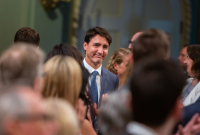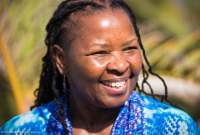Support strong Canadian climate journalism for 2025
Some global injustices look you straight in the face. Climate change is one of them.
For those among us whose life experiences thread across borders, climate change weighs heavily on our hearts because of its familiar human face: family, friends, colleagues. Many of us are deeply connected to climate vulnerable countries in the Global South, who will be among the first to feel the effects of runaway climate change. It’s why we’re advocating so hard for all nations to commit (not aspire) to aligning their climate action plans with the goal of limiting global warming to below 1.5 degrees C by 2020.
This week, at the COP24 climate conference in Poland, the world’s governments have a chance to up their collective ambitions to meet that goal and live up to the action our shared humanity requires.
Bringing this home, next week’s final round of negotiations will be kicked off by the seventieth anniversary of the creation of the Universal Declaration of Human Rights. A coincidence, but an important reminder that human rights and climate action are a package deal.
Climate policies are a crucial part of safeguarding people’s rights, such as the rights to life and an adequate standard of living, which are enshrined in the declaration. In the coming decades, climate change is expected to cause about a quarter of a million new deaths each year from malnutrition, malaria, diarrhoea and heat stress (with health costs running into the billions). Despite Africa’s being an insignificant contributor to climate change, the United Nations has warned that Africa is “at a tipping point” that could see years of social and economic gains derailed.
It's no wonder that people in climate vulnerable countries are forging solutions, speaking out and standing up, refusing to accept the crumbs of climate action proffered by governments and industry and refusing to go quietly into the (rising) seas. “ Survive. Thrive. 1.5” is a growing rallying cry among the climate vulnerable.
The small island state of Vanuatu, for instance, has announced that it is exploring legal action against fossil fuel companies and the countries supporting them. Vanuatu could make history by filing the world's first climate liability lawsuit from a national government. And next Tuesday, the Philippines Human Rights Commission will begin wrapping up its investigation into the role of 47 fossil fuels companies (including Canadian ones) in endangering the lives and livelihoods of Filipino communities.
Meanwhile, Canada (despite the federal government’s talk of multilateralism, equality and pride in diversity) has enacted policies that would contribute to temperatures hitting a catastrophic 5 degrees — forget the 1.5-degrees needed to protect climate vulnerable countries in the Global South.
But in Canada’s diversity, there is opportunity and hope for our government to do what is right, not what is easy. The ties that bind families, friendships, and social movements across oceans can be the ties that save us, motivating us all to advocate for policy solutions that end the production and consumption of dirty fossil fuels (like oil from the Alberta tar sands) and ensure accountability to the people with whom we share this planet.
Though the federal government announced this week that it would set tougher targets for cutting emissions, Canada’s work to halve global greenhouse gas emissions by 2030 and keep warming below 1.5 degrees is far from done. It’s not enough to set new targets. Canada actually needs to meet them. There are no magic bullets, but policy decisions like a managed transition away from the Alberta tar sands and towards a renewable energy system and just, green economy (at home and globally) are key to this solution.
Climate vulnerable countries are already starting to feel the consequences of the one degree of warming we’ve reached today. Staying within 1.5 degrees would protect hundreds of millions of people from typhoons, droughts, floods, and heat waves.
We are the last generation that can make things right. Stopping the worst impacts of climate change on all people shouldn’t be an aspiration but a moral imperative. We are all guardians of the 1.5 degrees goal.
What world leaders decide at COP24 and on the road to 2020 could help seal that fate of friends, family and colleagues abroad, so Canadians will be watching.
The question is: whose heads will world leaders leave above water?
Joanna Kerr is Executive Director of Greenpeace Canada and former head of Action Aid International. Njeri Kabeberi is a Kenyan human rights defender and the Executive Director of Greenpeace Africa.







Comments